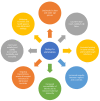The Problem with Delaying Measles Elimination
- PMID: 39066457
- PMCID: PMC11281398
- DOI: 10.3390/vaccines12070813
The Problem with Delaying Measles Elimination
Abstract
Measles is a highly infectious disease leading to high morbidity and mortality impacting people's lives and economies across the globe. The measles vaccine saves more lives than any other vaccine in the Essential Programme of Immunization and is also the most cost-effective vaccine, with an extremely high return on investment. This makes achieving measles elimination through vaccination a key child health intervention, particularly in low-income countries, where the overwhelming majority of measles deaths continue to occur. All countries and regions of the world have committed to achieving measles elimination, yet many have faced challenges securing political commitment at national and global levels and predictable, timely, and flexible support from global donors, and experienced setbacks during the COVID-19 pandemic. This has happened against a backdrop of stagnant measles vaccination coverage and declining enthusiasm for vertical programmes, culminating in a World Health Organization Strategic Advisory Group of Experts (WHO SAGE) review of the feasibility of measles eradication in 2019. Sustaining the elimination of measles long term is extremely difficult, and some countries have lost or nearly lost their measles elimination status in the face of ongoing importation of cases from neighbouring or closely connected countries in which elimination had been delayed. Thus, a widening equity gap in measles immunisation coverage creates challenges for all countries, not just those facing the greatest burden of measles morbidity and mortality. Delaying elimination of measles in some countries makes it cumulatively harder for all countries to succeed for three principal reasons: increased inequity in measles immunisation coverage makes outbreaks more likely to happen and to be larger; political will is very difficult to sustain; and immunity may wane to a point that transmission is re-established. New strategies are needed to support countries and regions in their vision for a world without measles, including ways to galvanise domestic, regional and global resources and ignite the political will that is essential to make the vision a reality.
Keywords: Measles; elimination; vaccination programmes; vaccine equity; waning immunity.
Conflict of interest statement
SB is director of The Centre for Vaccine Preventable Diseases at the University of Toronto, which operates using a mix of funding sources, including university funds, grant funding, and donations from vaccine manufacturers. The Centre has a robust set of governance processes at the school to ensure independent operation of the Centre and its Faculty and Staff. The authors alone are responsible for the views expressed in this article and they do not necessarily represent the views, decisions or policies of the institutions with which they are affiliated. Some of the content has been changed during institutional approval processes.
Figures
References
-
- Lemos D.R.Q., Franco A.R., Garcia M.H.d.O., Pastor D., Bravo-Alcantara P., de Moraes J.C., Domingues C., Cavalcanti L.P.d.G. Risk analysis for the reintroduction and transmission of measles in the post-elimination period in the Americas. Rev. Panam. Salud Publica. 2017;41:e157. doi: 10.26633/RPSP.2017.157. - DOI - PMC - PubMed
-
- Musa N., Ghoniem A., Hsu C.H., Mubarak S., Sume G., Sharifuzzaman M., Bak J., Hutin Y., Teleb N., Crowcroft N., et al. Progress toward Measles Elimination—World Health Organization Eastern Mediterranean Region, 2019–2022. Mmwr. Morb. Mortal. Wkly. Rep. 2024;73:139–144. doi: 10.15585/mmwr.mm7307a1. - DOI - PMC - PubMed
Publication types
Grants and funding
LinkOut - more resources
Full Text Sources
Miscellaneous


